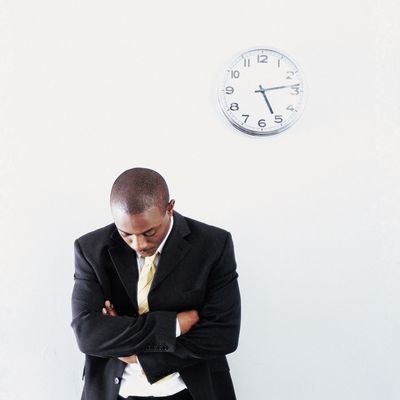
I knew what the link would be before I even opened the e-mail. From: a friend who’s also single and in her early 30s. Subject line: “For all those Peter Pans reveling in arrested development.” It was, of course, the most e-mailed article in the New York Times today: “Father’s Age Is Linked to Risk of Autism and Schizophrenia.” I’d already seen it all over Twitter and Facebook. “Hello male bio clock,” my friend wrote.
The Times reported similar findings in 2010, 2008, 2007, 2001. This isn’t groundbreaking news, but we’re all clicking as if it is. “The message to men is: ‘Wake up,’” Pamela Madsen, executive director of the American Fertility Association, told the Times in 2007. “It’s not just about women anymore, it’s about you, too.” And yet! In casual conversation and rom-com plots, only one gender remains haunted by a quiet, creeping tick-tock.
The perception is that studies like these apply mostly to aging lotharios with wives 40 years their junior. When the Wall Street Journal published yet another version of this story last year, it chose Larry King and Rod Stewart as poster boys. Yet women in their late 20s and early 30s who have no intention of becoming trophy wives forward this news with abandon every time it comes up. We’ve long wanted to share not just the parenting burden with a partner, but also our fertility anxieties. And here’s some solid science that shows we’re not alone. Or rather, that we shouldn’t be alone. We resent being asked by older relatives and well-meaning coworkers if we’re planning for kids yet, while our brothers and uncles and boyfriends are blissfully unquestioned. Rather than come right out say, “the way we talk about age and gender is fucked up” — because then we’d be not just dried-up, but dried-up and bitter — we express our annoyance and anxiety by recirculating the same handful of studies about sperm that’s passed its expiration date. “See?” we seem to be saying with each Facebook share, “we’re not alone in our futile quest to ‘have it all.’”
Biologically, both women and men are at ideal baby-making age years before completing a liberal arts degree, before the post-graduate malaise sets in, before they ease into staff designer or assistant editor or bartending jobs, before they select photos for their OkCupid profiles, before they register at Crate & Barrel, before they choose a broker. For men, too, the fertility drop-off begins at age 30 and accelerates at age 35. Now that thirtysomethings are the new twentysomethings and it has become an urban rule of thumb that most dudes aren’t going to opt for Park Slope parenthood much before 40, it’s time to stop associating fertility problems with just high-achieving women and dirty old men.
I’m not sure how many studies it’ll take until men in their 30s are fielding questions about whether they’re freezing their sperm, or until they’re casually deflecting questions about their plans to have children. But I am pretty sure that time is coming. So goodnight, you princes of the Mission, you Peter Pans of Greenpoint. Until then, sleep well.

